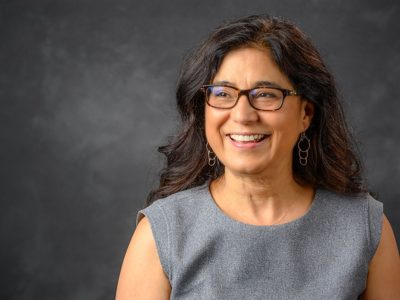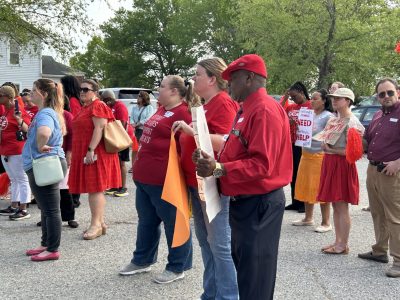
by Jordan Green
A new food alliance strives to create a more just, sustainable and holistic approach to combatting hunger in High Point.
The problem of food insecurity is bigger than one agency, and the whole model of fighting it needs to be radically shifted. That was the idea when Carl Vierling, Steve Key and the Rev. Joe Blosser met last fall to talk about the Greensboro-High Point metro area’s unfortunate ranking as No. 2 in the United States for food hardship.
Vierling, an activist who has a long history of working to address hunger, met with High Point Enterprise Editor Megan Ward around the same time to help the newspaper shape a series that would humanize the problem rather than numb people with statistics.
The ranking by the nonprofit Food Research Action Center applies to High Point and Greensboro together as part of a single metro area, and Vierling said he doesn’t think hunger is necessarily worse in one city than the other. He noted that seven out of the 24 food deserts in Guilford County are located in High Point. Six of them are contiguous, part of an unbroken block that swings from the east-central part of the city through the south side along Business 85.
“I think part of it is that we lost so many jobs in textiles and furniture,” Vierling said, explaining why in his view both Greensboro and High Point are challenged by hunger. “Those were good-paying jobs. With everything going overseas, those jobs have not been replaced. I used to work for Burlington Industries. I saw an awful lot of that happening. Those two industries going away has really hurt the area.”
While unemployment and underemployment as drivers of poverty account for some of the cause of hunger, excess food provided to food pantries by the US Department of Agriculture is supposed to ensure that no one goes hungry. Vierling said there might be a mismatch between the agencies stocking the pantries and the people who need the food.
“With the number of ethnic populations we have in Guilford County, it could be the food that’s available through the food pantries, they may not know what to do with it,” Vierling said. “It might not meet their dietary requirements. We’ve got a growing Muslim population. We’ve got a hundred different languages spoken in our school system.”
Vierling also said food supplied by the US Department of Agriculture is not an ideal solution to hunger because a lot of it is highly processed, and high in carbohydrates and sodium.
As director of service learning at High Point University, the Rev. Joe Blosser has had the opportunity to attend several regional and national conferences to learn about holistic approaches to food security that go beyond the traditional charity model. Professors at Wake Forest University and UNCG have already helped set up food councils in Forsyth County and Greensboro respectively, he said.
“The best practice that is out there is trying to think bigger than the typical programs of backpack meals and food pantries,” Blosser said. “We need to start talking about a just and sustainable food system from the ground to the plate and ask ourselves how are we helping people access good, healthy food. Part of it is also trying to expand urban agriculture with community gardens and food parks, working with social entrepreneurs. It’s about how we talk about cooking on a budget. All those sorts of things that have been less of concern, people looking at these new models around the country are saying they need to be more of a concern.”
The Greater High Point Food Alliance launched by Vierling, Blosser and Open Door Ministries Executive Director Steve Key quickly broke into five teams in an effort to address various aspects of the problem in coordinated fashion: food access; food education; urban agriculture; research, policy and advocacy; and neighborhood networks.
Vierling said the need for food pantries and other forms of assistance won’t be going away anytime soon. Particularly for seniors with limited income, food stamps only cover their needs for a couple weeks out of the month. But it’s also important to address the problem at a more structural level.
“Something both long and short term is community gardens,” he said. “If we did this the right way and if we do enough community gardens, there’s nothing to say we couldn’t have a processing plant or a cannery. We can start thinking about investing back in the community. Say we have a grant to help people develop new enterprises. Agriculture is still the No. 1 industry in the state of North Carolina. We want to make this sustainable. We want to empower people to take care of themselves and move away from a charity model. It’s so degrading to go to a food pantry. A large number of people we’re helping have never seen a food pantry. We’re seeing an increase year over year in the number of people coming through to get food assistance.”
Blosser said some people might dismiss community gardens as a solution to hunger, reasoning that their output is negligible. But he said he was surprised to learn that a local Kiwanis Club produced a ton of food from their community garden in one year when he spoke to one of the club’s members.
“The other big benefit of community gardens is they reclaim community space and they provide a sense of ownership,” Blosser said. “They can be kind of a focal point over which people can gather. Other cities have had tremendous success in neighborhoods that have struggled. It gets people out of their houses. We have a couple of gardens in town that are doing fairly well. In the West End they’re wanting to do a community garden but have a walking track around it. They want to put in a park so the kids can play while mom and dad are working.”
Figuring out how to match people who need healthy and affordable food with those who want to make a livelihood from food is more complicated than it might seem, Blosser said.
“We’re hoping that some of the people on our urban agriculture team can help us answer that question,” he said. “We also have the neighborhood networks. We’re hoping that those neighborhoods as they look at their resources and their assets they’ll say, ‘We need to get in touch with a farmer,’ and they’ll reach out to the urban ag team.”
About 40 High Point University students have been assisting the food alliance as part of their senior capstone course in marketing, consulting and event management, Blosser said. The students developed the food alliance’s website, and have been contacting rental companies to procure chairs for a March 20-21 food summit. The students are also organizing their own event — You Can Cook It, scheduled for March 31.
“It’s going to be an ‘Iron Chef’ event; they’re going to get some of our more notable chefs from High Point and give them a food box,” Blosser said. “It’s going to be a challenge because what’s in the food box is pretty random. But they’ll have demonstrations at Centennial Station, and it will be an educational opportunity for people to learn how to be creative with limited resources.”
Blosser said the last thing the volunteers want to do is incorporate another nonprofit that will duplicate services that are already being provided in High Point.
“This is a bold experiment; we’re not sure what will happen,” Blosser said. “We hope people will come out and be inspired to do more. With the food alliance, we do not want to be one more nonprofit in the community. When people ask to volunteer and give money, it’s not us. We’ll ask, ‘What do you want to do? Here’s who you need to talk to.’ We’ll be more of a communication hub.”
Join the First Amendment Society, a membership that goes directly to funding TCB‘s newsroom.
We believe that reporting can save the world.
The TCB First Amendment Society recognizes the vital role of a free, unfettered press with a bundling of local experiences designed to build community, and unique engagements with our newsroom that will help you understand, and shape, local journalism’s critical role in uplifting the people in our cities.
All revenue goes directly into the newsroom as reporters’ salaries and freelance commissions.





Leave a Reply